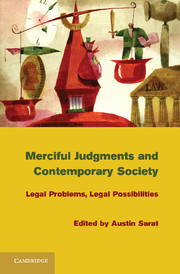Book contents
- Frontmatter
- Contents
- Acknowledgments
- Contributors
- When Can or Should Legal Judgment Be Merciful? An Introduction
- 1 The Place of Mercy in Legal Discourse
- Commentary on Chapter 1
- 2 Mercy, Crime Control, and Moral Credibility
- Commentary on Chapter 2
- 3 Defending a Role for Mercy in a Criminal Justice System
- Commentary on Chapter 3
- 4 Actions of Mercy
- Commentary on Chapter 4
- 5 A Feminist View of Mercy, Judgment, and the “Exception” in the Context of Transitional Justice
- Commentary on Chapter 5
- Index
- References
4 - Actions of Mercy
Published online by Cambridge University Press: 05 December 2011
- Frontmatter
- Contents
- Acknowledgments
- Contributors
- When Can or Should Legal Judgment Be Merciful? An Introduction
- 1 The Place of Mercy in Legal Discourse
- Commentary on Chapter 1
- 2 Mercy, Crime Control, and Moral Credibility
- Commentary on Chapter 2
- 3 Defending a Role for Mercy in a Criminal Justice System
- Commentary on Chapter 3
- 4 Actions of Mercy
- Commentary on Chapter 4
- 5 A Feminist View of Mercy, Judgment, and the “Exception” in the Context of Transitional Justice
- Commentary on Chapter 5
- Index
- References
Summary
They stood gazing at the artificial Negro as if they were faced with some great mystery, some monument to another's victory that brought them together in their common defeat. They could both feel it dissolving their differences like an action of mercy. Mr. Head had never known before what mercy felt like because he had been too good to deserve any, but he felt he knew now.
– Flannery O’ConnorTo know what mercy is, must one have received it? The losers don't write history, and (known) criminals don't write punishment theory. The scholars who do write punishment theory disagree on how to justify punishment, but they tend to agree that punishment is justifiable on some normative account. And if punishment is just, mercy is viewed as a threat, an extralegal distortion of the principles of legal justice. Quite literally, a merciful judgment is a judgment against punishment. It seems those who are for punishment are logically required to be against mercy. But do the critics of mercy fully understand what they oppose? Is the philosophical critique of mercy equivalent to victors’ history?
- Type
- Chapter
- Information
- Merciful Judgments and Contemporary SocietyLegal Problems, Legal Possibilities, pp. 205 - 233Publisher: Cambridge University PressPrint publication year: 2011



